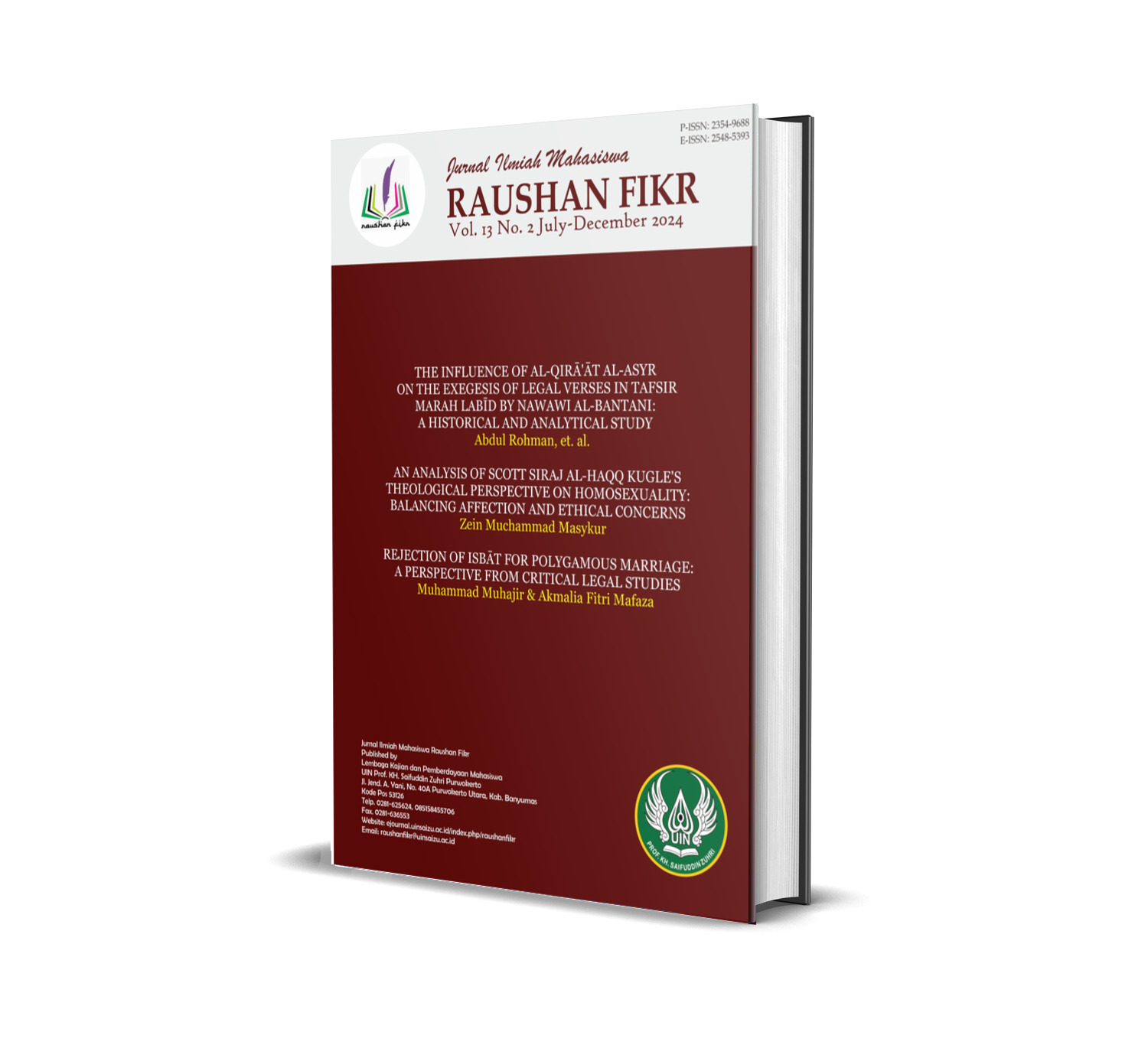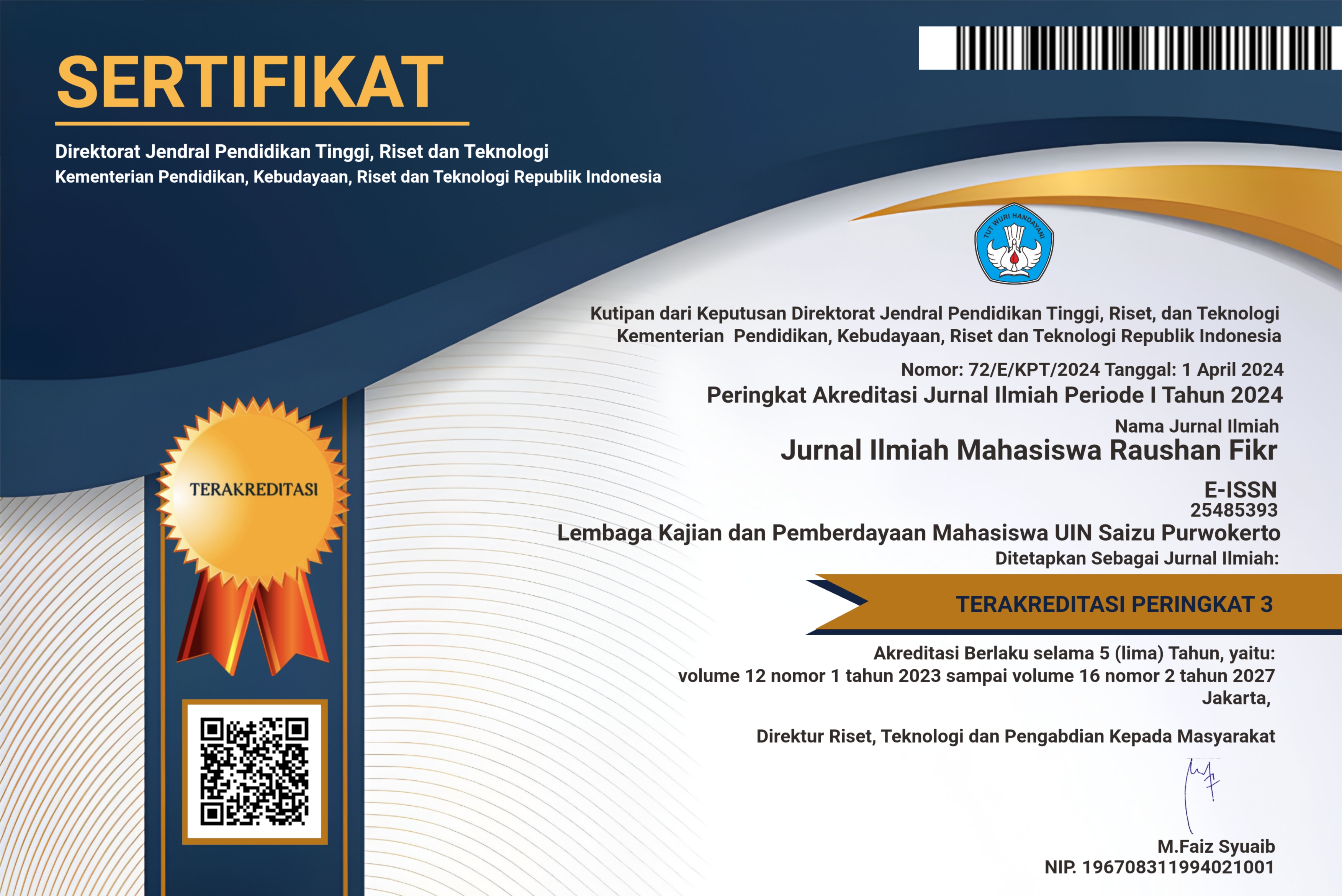Understanding Religious Moderation and Quranic Verses on Interfaith Relations Among Ulama in North Sumatera Binjai City
DOI:
https://doi.org/10.24090/jimrf.v13i2.11843Keywords:
Religious Moderation, al-Qur’an, Binjai City UlamaAbstract
Wasathiyyah in Islam is a concept of moderation that emphasizes justice, balance and tolerance, as reflected in the Qur’an and hadith. However, these values are often misunderstood and misused. This article highlights the role of the Ulama of Binjai City in instilling Islamic moderation values in society. The focus of this research is the view of the Ulama of Binjai City on the relationship between Islam and other religions, according to the teachings of the Qur’an and the interpretation of the Indonesian Ulema Council (MUI) of Binjai City. This research uses the Living Qur’an method, which combines textual analysis with real-life contexts to understand the views and attitudes of the ulama towards followers of other religions. The results show that the Qur’an teaches the importance of justice and tolerance in interfaith relations, which the Binjai City Ulema interpret as an obligation to respect the beliefs of others while maintaining their own. These clerics gained their understanding of moderation from their teachers and primary sources. The findings indicate that the internalization of Islamic moderation values by the Ulama of Binjai City contributes to interfaith harmony in societyDownloads
References
Afsaruddin, A. (2009). The Hermeneutics of Inter‐Faith Relations: Retrieving Moderation and Pluralism as Universal Principles in Qur’anic Exegeses. Journal of Religious Ethics, 37(2), 331–354. DOI: https://doi.org/10.1111/j.1467-9795.2009.00389.x
Akhter, N., Ur Rahman, S., Aziz, M. I., Rauf, M. S., & Rafiq, S. (2023). Quranic Context and Interfaith Dialogue (Building Mutual Understanding and Acceptance in A Pluralistic Society). Palarch’s Journal of Archaeology of Egypt/Egyptology, 20(2), 1090–1102.
Anggraeni, D., & Suhartinah, S. (2018). Toleransi Antar Umat Beragama Perspektif Kh. Ali Mustafa Yaqub. Jurnal Studi Al-Qur’an, 14(1), 59–77. Https://Doi.Org/10.21009/Jsq.014.1.05 DOI: https://doi.org/10.21009/JSQ.014.1.05
Az-Zuhaili, W. (N.D.). Tafsir Al-Munir (Jilid I).
Badan Pusat Statistik Kota Binjai. (N.D.). Retrieved June 25, 2024, From Https://Binjaikota.Bps.Go.Id/Statictable/2018/12/26/329/Persentase-Penduduk-Menurut-Kecamatan-Dan-Agama-Yang-Dianut-Di-Kota-Binjai-2017.Html
Fahy, J., & Haynes, J. (2018). Introduction: Interfaith On The World Stage. The Review Of Faith & International Affairs, 16(3), 1–8. DOI: https://doi.org/10.1080/15570274.2018.1509278
Fatikah, N. (2024). Moderation Village: The Implementation Of Religious Moderation Portrait At Interfaith Family. Ilmuna: Jurnal Studi Pendidikan Agama Islam, 6(1), 1–12.
Fatkhurrokhim, F., & Khoirudin, A. (2024). Moderation In Muhammadiyah Interpretation (Analysis Of Thematic Interpretation Regarding Social Relations Among Religious Communities By Majelis Tarjih). 3(1), 1609–1620.
Huff, P. A. (2000). The Challenge of Fundamentalism for Interreligious Dialogue. Crosscurrents, 94–102.
Husna, H. Z. (2022). Moderasi Beragama Perspektif Al-Quran Sebagai Solusi Terhadap Sikap Intoleransi. Al-Mutsla, 4(1), 41–53. Https://Doi.Org/10.46870/Jstain.V4i1.202 DOI: https://doi.org/10.46870/jstain.v4i1.202
Ibnu Katsir. (N.D.). Tafsir Al Qur’an Al ‘Azim (Jilid I).
Indainanto, Y. I., Dalimunthe, M. A., Sazali, H., & Kholil, S. (2023). Islamic Communication in Voicing Religious Moderation as An Effort to Prevent Conflicts of Differences in Beliefs. Pharos Journal of Theology, 104(4). DOI: https://doi.org/10.46222/pharosjot.104.415
Jarir Thabari, A. J. M. Bin. (N.D.). Tafsir Ath-Thabari Al- Musamma Jami’ Al-Bayan Fi Ta’lil Qur’an (Jilid I).
Juhri, M. A. (2020). Paradigma Tauhid Sebagai Basis Mewujudkan Moderasi Islam Di Indonesia. Jurnal Ilmiah Mahasiswa Raushan Fikr, 9(2), 1–9. DOI: https://doi.org/10.24090/jimrf.v9i2.4141
Khilmiyah, A., & Wahyudi, A. (2021). Strengthening the Attitude Of Religious Moderation Through The Study Of Tolerance Values In Al-Munir’s Tafsir. Didaktika Religia, 9(2), 295–316.
Kubro, A. D. J., & Ali, M. (2021). The Understanding Of Islamic Moderation (Wasatiyyah Al-Islam) And The Hadiths On Inter-Religious Relations In The Javanese Pesantrens. Indonesian Journal Of Islam And Muslim Societies, 11(2), 377–401. DOI: https://doi.org/10.18326/ijims.v11i2.351-376
Lessy, Z., & Rohman, M. (2022). Muslim Millennial Youths Infusing Religious Moderation: A Case Study Approach to Investigate Their Attitude. Dialogia: Jurnal Studi Islam Dan Sosial, 20(1), 1–27. DOI: https://doi.org/10.21154/dialogia.v20i1.3791
Majemu, S. A. (2024). Strengthening Interfaith Dialogue Through Religious Moderation Discourse: An African Perspective. International Journal of Civilizations Studies & Tolerance Sciences, 1(1), 76–85. DOI: https://doi.org/10.54878/2apnq261
Mui Kota Binjai, M. (2024, January 24). Wawancara Dengan (Pengurus Majelis Ulama Indonesia Mui Kota Binjai). (Kota Binjai).
Mulyanti, V., & Muhajarah, K. (2023). Religious Moderation as A Bridge to Peace: An Approach That Emphasizes Tolerance, Mutual Understanding, And Interfaith Dialogue. Wasathiyah: Jurnal Studi Moderasi Beragama Indonesia, 1(2), 82–91.
Munandar, S. A., & Amin, S. (2023). Contemporary Interpretation Of Religious Moderation In The Qur’an: Thought Analysis Quraish Shihab And Its Relevance In The Indonesian Context. Qist: Journal Of Quran And Tafseer Studies, 2(3), 290–309. DOI: https://doi.org/10.23917/qist.v2i3.1448
Qurtuby, S. A. (2012). Reconciliation From Below: Indonesia’s Religious Conflict And Grassroots Agency For Peace. Peace Research, 135–162.
Ritonga, R., Hamid, A., Siregar, I. R., Akhyar, A., Nst, A. M., Ritonga, S., & Amiruddin, A. (2023). Penguatan Moderasi Beragama Bagi Santri Pondok Pesantren Darussalam Parmeraan. Jurnal Pengabdian Masyarakat Bumi Raflesia, 6(1), 101–107.
Scheffler, T. (2007). Interreligious Dialogue And Peacebuilding. Die Friedens-Warte, 173–187.
Syifa, M. M. (2019). Formulasi Konsep Moderasi Islam Berbasis Keindonesiaan Dalam Mereduksi Radikalisme Agama di Indonesia (Kajian Epistemologis-Historis). Jurnal Ilmiah Mahasiswa Raushan Fikr, 8(1), 31–41. DOI: https://doi.org/10.24090/jimrf.v8i1.3054
Tottoli, R. (2006). Tolerance and Coercion in Islam. Interfaith Relations in The Muslim Tradition.
Ulya, M., Rafiqah, L., Liana, N., & Masyhuri, A. A. (2024). The Principle of Religious Moderation from The Qur’an In the Context Of Modern Society. 3(1), 1621–1634.
Waliyuddin, M. N. (2022). Counter-Radicalism Movement and Hybridization Of Identity In The Young Interfaith Community In Yogyakarta. Presented at The Proceedings Of The 1st International Conference On Social And Islamic Studies (Icsis) 2021.
Wijaya, C., Abdurrahman, A., Saputra, E., & Firmansyah, F. (2021). Management Of Islamic Education Based On Interreligious Dialogue In The Learning Process In Schools As An Effort To Moderate Religion In Indonesia. Review Of International Geographical Education Online, 11(5), 2146–0353.
Zuhri, A., & Yumni, A. (2022). Fikih Moderation Of Religion According To The Qur’an (The Role Of Religious Figures In Strengthening Religious Harmony). Al-Manhaj: Jurnal Hukum Dan Pranata Sosial Islam, 4(2), 721–726.
Downloads
Published
How to Cite
Issue
Section
License
Copyright (c) 2024 Al Fiqri Ardiansyah, Hasnah Nasution, Ali Darta

This work is licensed under a Creative Commons Attribution-NonCommercial-ShareAlike 4.0 International License.
Authors who publish with this journal agree to the following terms:
- Authors retain copyright and grant the journal right of first publication with the work simultaneously licensed under a Creative Commons Attribution-NonCommercial-ShareAlike 4.0 International License that allows others to share the work with an acknowledgement of the work's authorship and initial publication in this journal.
- Authors are able to enter into separate, additional contractual arrangements for the non-exclusive distribution of the journal's published version of the work (e.g., post it to an institutional repository or publish it in a book), with an acknowledgement of its initial publication in this journal.
- Authors are permitted and encouraged to post their work online (e.g., in institutional repositories or on their website) prior to and during the submission process, as it can lead to productive exchanges, as well as earlier and greater citation of published work (See The Effect of Open Access).














